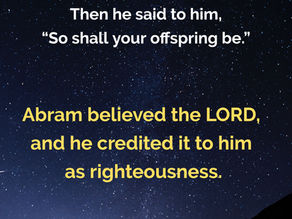Romans 3:20-26 - The Seat of our Salvation
- Chad Werkhoven
- May 1, 2025
- 6 min read
God presented Christ as an atonement... what does that mean?
Romans 3:20-26 (NIV)
20 Therefore no one will be declared righteous in God’s sight by the works of the law; rather, through the law we become conscious of our sin.
21 But now apart from the law the righteousness of God has been made known, to which the Law and the Prophets testify. 22 This righteousness is given through faith in Jesus Christ to all who believe. There is no difference between Jew and Gentile, 23 for all have sinned and fall short of the glory of God, 24 and all are justified freely by his grace through the redemption that came by Christ Jesus. 25 God presented Christ as a sacrifice of atonement, through the shedding of his blood—to be received by faith. He did this to demonstrate his righteousness, because in his forbearance he had left the sins committed beforehand unpunished—26 he did it to demonstrate his righteousness at the present time, so as to be just and the one who justifies those who have faith in Jesus.
Canons of Dordt
Point 2 - Limited Atonement
Article 1: God’s Right to Condemn All People
Romans 5:12-14 - Mis-Markmanship
Deuteronomy 28:15-20 - Not A Tame Lion
Luke 15:11-16 - Prodigious Deprivation
Psalm 143 - Aggressive Prayer Pattern
Article 2: The Manifestation of God’s Love
Zephaniah 3:14-17 - The Mighty Warrior Who Saves
Lamentations 3:19-23 - Great Is Thy Faithfulness
Article 3: The Preaching of the Gospel
1 Timothy 2:1-7 - God Our Savior
Rom 10:14-17 - The Power of Preaching
1 Cor 1.23-24 - God's Foolishness
Psalm 93 - Mightier Than Chaos
Article 4: A Twofold Response to the Gospel
John 6:37-40 - Tensegral Theology
John 12:42-50 - Buffet Theology
Article 5: The Sources of Unbelief and of Faith
James 1:13-18 - The Devil (didn't) Make You Do It
Ecclesiastes 7:25-29 - Many Schemes
Ephesians 2:8 - The Gift of God
Psalm 95 - The LORD is OUR God
Article 6: God’s Eternal Decree
Ezekiel 36:24-27 - A Whole New Reality
Romans 9:15-21 - God's Mercy, Not Your Effort
2 Thessalonians 2:10-12 - Love The Truth
Article 7: Election
Ephesians 1:3-6 - Before the Foundation
Deuteronomy 7:1-10 - Set Apart
John 17:1-5 - Sovereign Submission
Psalm 115 - God Does What He Pleases
Article 8: A Single Decree of Election
Romans 4:1-8 - One and the Same
Romans 4:9-17 - Chicken or Egg?
Romans 4:18-25 - Faithfully Face the Facts
Hebrews 11:39-40 - Promises Kept
Psalm 33 - God's Control, Authority & Presence
Article 9: Election Not Based on Foreseen Faith
2 Timothy 1:7-10 - Passive & Powered
Deuteronomy 9:4-6 - You're Not That Awesome
Psalm 91 - The Shelter of the Most High
Article 10: Election Based on God’s Good Pleasure
Luke 2:13-14 - Christmas in March
Galatians 4:1-7 - From Slave to Son
1 Peter 2:9-10 - You're The Best Thing God Has!
Article 11: God’s election is unalterable.
Malachi 3:6-7 - Keep It Simple
Hebrews 6:13-20 - Unchanging Anchor
Hebrews 13:1-8 - Keep On Loving
Hebrews 6:13-20 - Unchangeable Blessing
Article 12: The Assurance of election
Hebrews 11:1-6 - Confident Assurance
Malachi 3:14-18 - Childlike Fear
2 Corinthians 7:8-11 - Godly Sorrow
Psalm 65 - The Hearer of Prayers
Article 13/14: The Fruit of our assurance
Isaiah 57:14-21 - God's Second Residence
2 Peter 1:3-10 - Make Every Effort
Isaiah 42:1-9 - The Sovereign & His Servant
Article 1: The Punishment Which God’s Justice Requires
God is not only
supremely merciful,
but also supremely just.
This justice requires
(as God has revealed in the Word)
that the sins we have committed against his infinite majesty
be punished with both temporal and eternal punishments,
of soul as well as body.
We cannot escape these punishments unless satisfaction is given to God’s justice.
Summary
It would be entirely possible for us as we read the Bible together this year to understand nearly every doctrine in the Canons of Dordt by only reading from the first couple of chapters of Ephesians and the first half of the book of Romans. These two epistles from Paul so clearly unpack and explain Christian theology, yet we've been intentionally 'throttling' these two books this year - only so that we can see that it's not just these two books that form our doctrine, but that the whole of God's Word echoes what is condensed in Paul's books. This year, we've focused on passages that aren't quite as familiar.
But every so often, we need to dive back into these familiar passages which shine so much light on what God has done for us in Christ. Since we could spend the entire week unpacking this passage, and since this likely won't be the last time we read this awesome passage this year, we're only going to focus in on the first half v25 today.
God
One of the biggest themes of the Canons is that every aspect of our salvation, from beginning to end, is a product of God's sovereignty (His control, authority & presence). So it makes sense that this monumental sentence starts with what God did to make your salvation possible.
presented
This is one of those fascinating words that every version translates differently, yet they're all correct. God put forward (ESV), made publically available (LEB), publicly displayed (NET), and set forth Jesus.
Christ
Remember, Christ isn't Jesus' last name, it's His title. It seems awkward, but it would be more accurate for us to refer to Him as Jesus the Christ. The Greek word Christos means anointed, as does the Hebrew word Messiah. Jesus is anointed by God as our prophet (the One who represents God to us) and our King. But this passage focuses in on the fact that Jesus is also anointed to be our priest - the One who represents us to God.
[as a sacrifice of] atonement
This phrase translates one word, and it too is a fascinating one! Other translations use the older word propitiation (ESV, KJV), which means payment. It's more literally translated as the mercy seat (LEB, NET), as it's the same word used to describe the seat of God formed by the angel wings above the Ark of the Covenant. It was on this seat that sacrificial blood was sprinkled once a year on Yom Kippur (the Day of Atonement).
through [the shedding of] His blood
The NIV added the words the shedding of to help us understand what Paul meant here. Blood must be shed for sins to be forgiven because blood represents the life God grants contingent upon man's obedience and covenant faithfulness.
Dig Deeper
[to be received] by faith.
Once again, the NIV uses an entire phrase to translate just two words: through faith. Faith is the conduit through which God's grace, earned for us by Christ, flows into your life. Without faith - that is, without your connection to God - Christ's atonement is just an empty, theoretical exercise.
God has given you the faith you need as a gift (Ephesians 2:8), but He also expects you to make every effort to add to your faith goodness, knowledge, etc. (2 Peter 1:5). In other words, God wants you to fully receive by faith the saving benefit that come through Christ's sacrifice of atonement, and He also wants those benefits to spill over into every aspect of your life.
ACKNOWLEDGE WHO GOD IS: Our Father, who saved us by presenting His Son as a sacrifice of atonement;
ALIGN YOUR LIFE WITH GOD'S WILL: Thank God for the faith He's given you to accept this salvation and pray that you will make every effort to add to it;
ASK GOD FOR WHAT YOU NEED:
Read the New Testament in a year! Today: Matthew 19




















Comments